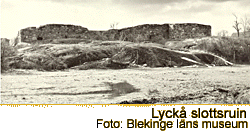Meet the Middle Ages
BackLösen/Lyckå

In the early Middle Ages, Lösen was the most important locality at the mouth of the Lyckeby River in Blekinge. The iron of Vissefjärda and Algutsboda was taken here. Later, it was shipped to the ports in northern Germany. This iron was called " Blekinge-iron". To the peasants of Emmaboda, Lösen was the nearest harbour. As well as iron, the farmers would bring butter, cheese and grain. They traded this for salt, cloth, spices, wine and German beer. Just like Blekinge, Lösen belonged to Denmark during the best part of the Middle Ages. The trade on the borders of Sweden and Denmark was very important at this time. At times of unrest it might have been difficult to travel to the coast. Between 1332 and1360, however, Blekinge was Swedish.
Around 1450, the Lösen Bay had become so shallow, that large vessels no longer could enter the harbour. The town was then moved four kilometres to the west and named Lyckå.
Though quite small, the ports of Lösen and Lyckå were very important to the merchants and the peasants of the region.